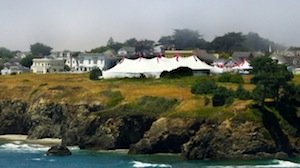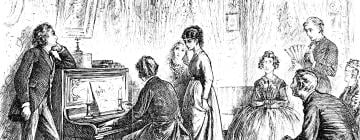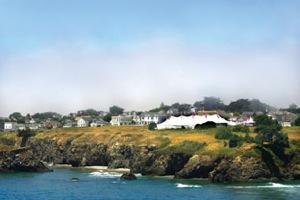Music will be filling the air around Mendocino and Fort Bragg throughout the month of July as the Mendocino Music Festival celebrates its 25th anniversary. Over the last quarter century, the festival has grown into a unique summer musical event. There’s a rural and localized sensibility (roughly half the attendees live in the area) that fits the setting. And the main venue itself, a beautiful tent set on the headlands, is, in the words of festival cofounder Susan Waterfall, “an ideal place,” especially for a festival that bills itself as “Music on the Edge of the World.”

It’s also an ideal setting in which to experience a range of music. Although rooted in classical music, the festival offers something for everyone, with orchestra concerts and chamber music events; jazz, big band, bluegrass, blues, folk, world, and contemporary music; dance; and lectures and recitals. A great example of this variety is the July 16th main-tent concert, featuring Waterfall, her son Julian Pollack, and Jeremy Cohen and Quartet San Francisco. They’ll be playing John Adams’ Road Movies, Gershwin’s I Got Rhythm Variations, and Stephen Reich’s Eight Lines, as well as music by P.D.Q. Bach, Dave Brubeck, and Astor Piazzolla. According to Waterfall, “all of the music delivers the lively, irresistible rhythms of jazz, minimalism, tango, and mambo, even country and pop music.” The program is appropriately called “Irresistible Grooves.”
This blending of musical styles is becoming more common — even “ubiquitous,” using Waterfall’s term — and it’s something she’s passionate about, for musicians and audiences as well as for the future of classical music itself. Pop music, she believes, is something that is vital and important to the people who listen to it, and as such should be considered a resource for classical composers. “It’s because we’re emerging from a warped and limited phase of classical music, especially in the United States,” she remarks. “The American vernacular music traditions (pop, jazz, et cetera) are really a wonder of the world! It’s insane that American classical music kept such a guarded relationship with this treasure until recently.” For her, this permeable membrane between different genres, as she calls it, is vitalizing classical music.
She goes on to add that “Copland, Gershwin, and Bernstein began to draw from our vernacular, and now Adams, Reich, [Steven] Stucky, and many others are at home in both worlds, enabling American music to achieve meaningful autonomy from the European tradition — which is a great tradition, but not ours!” Waterfall notes that pieces like Reich’s Pulitzer Prize–winning Double Sextet lets classical pianists feel like they’re rock pianists for a few moments, without losing their classical intensity, since they can groove. For her, “the transformation of classical music will be complete when all musicians can both improvise and read complex scores.”
This willingness to embrace various genres and have them work together is a plus for her festival audiences, as well, Waterfall believes. Those steeped in traditional music get a chance to hear music they wouldn’t normally listen to, including some contemporary classical composers, and often find they love certain aspects of it. The same is true for listeners without a classical music background, as they have a chance to experience music that explores their world with the depth of the classical music tradition.
While “Irresistible Grooves” is certainly an intriguing program, the Mendocino Music Festival offers plenty of other enticing concerts, along with free-to-attend rehearsals, both in the main tent and in other locations, including some lovely church settings in Fort Bragg. Combine that with the beauty of the Mendocino coast, and you have a music festival that promises something for everyone in a fantastic spot, for a close-by summer getaway.

